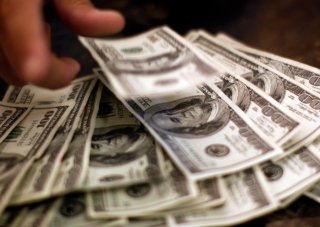How to Survive a Frankenstein Economy During a Pandemic
Americans are participating in a politically constructed economy stitched together from stimulus checks, subsidies, on-again/off-again virus interruptions, border controls, and ill-informed actions taken by industry leaders.
America has what I call a Frankenstein economy. No, I don’t mean people should lie awake at night wondering when a coronavirus-inspired, frightening, unfeeling beast-like economy will spiral out of control, turn on America, and wipe out its current and future prosperity. What I do mean is that Americans are participating in a politically constructed economy stitched together from stimulus checks, subsidies, on-again/off-again virus interruptions, border controls, and by ill-informed actions taken by business and industry leaders who find themselves groping about in the dark with tired eyes and no guiding light.
Yes, based on gross domestic product (GDP) growth estimates, this stumbling, wavering economic creature is producing a lot of goods and services—and yes, a lot of people have good jobs, are fortified by government stimulus money, and are banking more than ever in their lives. Yet there are also millions of Americans who are no longer part of the workforce, and many are instead keeping the home fires burning while taking care of kindergarten- and school-age children who are shut out of their usual daily occupations.
There is also a large number of men and women who were forced away from hospitality, healthcare, and education jobs. As they’re now being called back to work, they still wrestle with other virus-injected interruptions in their lives. Alongside this crowd are countless industry employees and decisionmakers who cannot determine with past accuracy what the price of energy will be next month, when to expect deliveries of paint, plastic pipe, computer chips, or even salmon-flavored cat food. Indeed, school lunchroom managers nationwide are now advised that even bread and apple sauce will be in short supply.
Yes, while the Frankenstein economy stumbles forward, some parts of its reconstructed legs move better than others. The construction sector was never paralyzed by the coronavirus; it’s operating with strength and agility, pulling lots of resources away from other sectors that were not so lucky when shutdowns were ordered. The airline sector is finally flexing its previously clipped wings, reporting profits, and searching for additional carrying capacity, while acknowledging that huge virus-inspired federal subsidies kept the sector aloft. And parts of the education sector are still trying to determine when to resume activities, to what extent to reopen, and how to meaningfully use the large flow of taxpayer funds destined to come in its direction.
Should anyone be surprised when they learn that the unemployment for those with a college education is just 3.5 percent while the rate for those without a high school diploma is a dismally high 10.2 percent and that the gap has widened from June 2020 when the higher educated rate was 7 percent and the lower educated was 15.4 percent? And isn’t it to be expected that housing prices are accelerating at breakneck rates when cash-rich consumers can borrow mortgage money at rock-bottom rates, home-bound workers are searching for larger quarters, and the prices for lumber, steel, and copper sheet shot skyward?
It’s all part of the Frankenstein behemoth that was constructed one piece at a time by Washington policymakers in an honest attempt to somehow resuscitate the economy from an induced coma so that Americans might avoid an even worse outcome than the one they now grapple with. Yes, GDP growth looks good, and the employment numbers are headed in the right direction, so shouldn’t people celebrate the fact that some of the major Frankenstein prosthetics are working pretty well—and maybe they could ask for some more? Or should they instead pause, recognize this beast for what it is, back away, and do their best to avoid adding new politically generated parts, hoping that a more normal economy will later emerge?
Life’s lessons and deep history show that as smart as people may think we are, and as large as their laboratory of digital gadgetry may appear to be, they cannot rely on the governmentally determined economic actions of empowered political agents to outperform the independent actions of billions of decisionmakers who, in less regulated times, do their best to find prosperity and happiness in a complex and sometimes uncaring world.
People should know that they cannot create enduring prosperity with more printing-press money, growing deficits, and more command-and-control sutures. A Frankenstein monster is not a good substitute for a market economy. Let’s hope that America sees more “normal” times soon.
Bruce Yandle is a distinguished adjunct fellow with the Mercatus Center at George Mason University, dean emeritus of the Clemson College of Business and Behavioral Sciences, and a former executive director of the Federal Trade Commission.
Image: Reuters.

